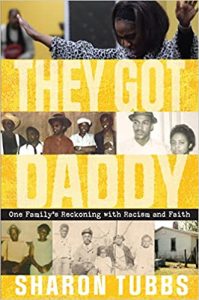Excerpt from They Got Daddy: One Family’s Reckoning with Racism And Faith: Excerpt
THEY GOT DADDY: ONE FAMILY’S RECKONING WITH RACISM AND FAITH
 An unforgettable journey through racism and faith across the generations.
An unforgettable journey through racism and faith across the generations.
January 15, 1959―a day that changed one family forever. White supremacists kidnapped and severely beat rural Alabama preacher Israel Page, nearly killing him because he had sued a White sheriff’s deputy for injuries suffered in a car crash. After “they” “got Daddy,” Israel Page’s children began leaving the Jim Crow South, the event leaving an indelible mark on the family and its future. Decades later, the events of that day fueled journalist Sharon Tubbs’s epic quest to learn who had “gotten” her mother’s daddy and why.
They Got Daddy follows Tubbs on her moving journey from Fort Wayne, Indiana, to the back roads and rural churches of Alabama. A powerful revelation of the sustaining and redemptive power of faith and unflinching testimony to the deeply embedded effects of racism across the generations, it demonstrates how the search for the truth can offer a chance at true healing.
Excerpted from They Got Daddy: One Family’s Reckoning with Racism, by Sharon Tubbs. Indiana University Press, 2023. Reprinted with permission.
He didn’t cozy up to them right away that day, not likely—not for two strangers who weren’t from around these parts. He kept his distance, there on the porch, content to peer at them, offer his typical greeting for white men: “Boss?”
They were looking for a man called Israel, they told him, Israel Page.
Could this have something to do with the court case? The possibility had to enter his mind. It was January 15, 1959, four and a half years since the accident and the injury, since he could drill a well and bring home a decent paycheck. In some ways he had recovered. He’d gotten his mind back, his thinking straight, and he could still preach, that’s for sure. But he’d lost a lot, too. His arm hung limp at his side, useless as a loaf of hog headcheese. Still, there was a measure of courage to him. That’s what it took, courage, for a Negro to go up against a white sheriff’s deputy in Alabama over the whole thing. Now, in less than twenty-four hours, Israel Page would get the trial he’d waited for, and he expected justice to side with him.
With all that in mind, compounded by the racial tensions of the day, it’s a wonder that he let down his guard at all, that he opened up to those white strangers the way he did. But, indeed, he did. Faith assured him that the Lord lingered near. He trusted God to protect him with the kind of trust that drives all the fear out of a man and, some might say, a little of his common sense, too.
Whatever the reason, he told the men that if they were looking for Israel Page, they’d found him. You could imagine their relief, since they’d searched all over Browns and Uniontown by then, driving through backcountry roads. They didn’t live in this town, they said, and they heard he preached to the Negroes.
That’s how the conversation started anyway. He told the men about churches nearby, talking easily and for a good while, as he was known to do, and some- how the conversation turned to hunting dogs. He knew everything there was to know about hunting dogs. He had a few good beagles of his own, and he’d let them loose and follow them into the woods to sniff out the scent of easy prey—rabbit, coon, or even squirrel—which his wife, Margaret, turned into dinner. That’s when the men told him about a beagle they had. Matter of fact, they said, it was in their car, parked over there by the road. Would he come out, take a look?
Now, Margaret might have witnessed all this if she hadn’t been prepping for the next day. She busied herself inside the house, styling her hair with the hot pressing comb, parting it and straightening each section in preparation for their courthouse appearance. The pungent smell of smoked hair filled the wood board house. Unlike her husband, she would’ve wanted to get far away from their visitors. She didn’t make small talk with white folks. They’d grin to your face in the daylight, then cackle through slits in white sheets come night. She kept on parting and pressing her hair, pressing and parting.
It couldn’t have been too long before she noticed something wrong, though. The voices outside had stopped. She walked to the front door but saw nobody there, no one outside in view at all. She stepped onto the porch, then down the steps and into the yard, neck turning, voice calling out the nickname most called her husband: “Preacher?”
She walked fast around the yard, scanned the edge of the property, peer- ing across fields, hoping for a glimpse of him. She looked down the road until it curved and disappeared. No Preacher. Before long, their latest family car kicked up dirt coming toward the house. Inside, Robert Lee and Willie James, two of the older boys, along with a family friend, were returning from a trip uptown to see what they called a “picture show” back then.
Now they saw the worried look on their mother’s face.
Had they seen Preacher walking up the road?
They told her no. Willie James scoped the surroundings, his sense for detail absorbing the scene, as his younger brother Robert Lee stood alongside, slender and tall. No, Daddy wasn’t on the road, they said. Hadn’t seen anybody driving since they turned off Highway 80 onto the dirt pathway leading home.
No Preacher?
No, ma’am.
None of it made sense. Margaret’s mind whirled, piecing everything together. On the day before the big trial, men come to the house, asking for Preacher—white men. Then all of a sudden he’s gone, not a stitch of him anywhere, and as laid-back as he was, Preacher never walked that fast to get anywhere.
She and the boys inched to the edge of the red dirt, looked down the path time and again, satisfying themselves that they hadn’t missed something. Could he have turned down one of the side cuts, heading to the house of a friend or relative? Soon, they would enlist neighbors in a search throughout the area.
The younger kids still bided time inside the house, but eventually they, too, would catch on that something wasn’t right, and everything was wrong. Margaret, a tall thick woman with a strong back for picking crops, killing chickens, and milking cows—and perhaps an even stronger heart—opened her mouth and called out again and again: “Preacher? Pree-cherrr!”
BUY HERE
—
 Sharon Tubbs began her professional career as a newspaper reporter and editor. In a career that spanned seventeen years, she worked briefly for the Philadelphia Inquirer then for the Tampa Bay Times. As a journalist, she covered various beats that included small-town government, local crime, and national religious issues. Today, Sharon Tubbs is a writer, inspirational speaker, and the director of a nonprofit organization that empowers under-resourced residents in Fort Wayne, Indiana, to live healthier lives.
Sharon Tubbs began her professional career as a newspaper reporter and editor. In a career that spanned seventeen years, she worked briefly for the Philadelphia Inquirer then for the Tampa Bay Times. As a journalist, she covered various beats that included small-town government, local crime, and national religious issues. Today, Sharon Tubbs is a writer, inspirational speaker, and the director of a nonprofit organization that empowers under-resourced residents in Fort Wayne, Indiana, to live healthier lives.
Category: On Writing























